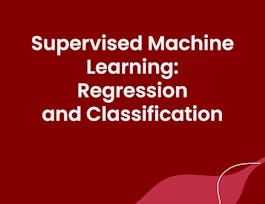AI is transforming the practice of medicine. It’s helping doctors diagnose patients more accurately, make predictions about patients’ future health, and recommend better treatments. This Specialization will give you practical experience in applying machine learning to concrete problems in medicine.


AI for Medical Prognosis
This course is part of AI for Medicine Specialization



Instructors: Pranav Rajpurkar
Sponsored by Syrian Youth Assembly
28,690 already enrolled
(778 reviews)
Recommended experience
What you'll learn
Walk through examples of prognostic tasks
Apply tree-based models to estimate patient survival rates
Navigate practical challenges in medicine like missing data
Skills you'll gain
Details to know

Add to your LinkedIn profile
4 assignments
See how employees at top companies are mastering in-demand skills

Build your subject-matter expertise
- Learn new concepts from industry experts
- Gain a foundational understanding of a subject or tool
- Develop job-relevant skills with hands-on projects
- Earn a shareable career certificate


Earn a career certificate
Add this credential to your LinkedIn profile, resume, or CV
Share it on social media and in your performance review

There are 4 modules in this course
Build a linear prognostic model using logistic regression, then evaluate the model by calculating the concordance index. Finally, improve the model by adding feature interactions.
What's included
11 videos3 readings1 assignment1 programming assignment4 ungraded labs
Tune decision tree and random forest models to predict the risk of a disease. Evaluate the model performance using the c-index. Identify missing data and how it may alter the data distribution, then use imputation to fill in missing data, in order to improve model performance.
What's included
15 videos1 assignment1 programming assignment3 ungraded labs
This week, you will work with data where the time that a disease occurs is a variable. Instead of predicting just the 10-year risk of a disease, you will build more flexible models that can predict the 5 year, 7 year, or 10 year risk.
What's included
16 videos1 assignment1 programming assignment2 ungraded labs
This week, you will fit a linear model, and a tree-based risk model on survival data, to customize a risk score for each patient, based on their health profile. The risk score represents the patient’s relative risk of getting a particular disease. You will then evaluate each model’s performance by implementing and using a concordance index that incorporates time to event and censored data.
What's included
24 videos4 readings1 assignment1 programming assignment3 ungraded labs
Instructors

Offered by
Why people choose Coursera for their career




Learner reviews
778 reviews
- 5 stars
79.17%
- 4 stars
15.68%
- 3 stars
3.08%
- 2 stars
1.41%
- 1 star
0.64%
Showing 3 of 778
Reviewed on Aug 4, 2020
This course enabled me to apply machine learning for prognosis related scenario & learn multiple risk assessment related scenario.
Reviewed on Apr 18, 2020
AI for Medical Prognosis gave me a panorama of machine learning models for patient survival prediction in a simple way.
Reviewed on Apr 25, 2020
This was a wonderful course, I am now able to see how this course relates to the actual medical field, where we go from diagnosis to treatment and finally prognosis.
Recommended if you're interested in Data Science

Johns Hopkins University

Fred Hutchinson Cancer Center

DeepLearning.AI

University of Michigan

Open new doors with Coursera Plus
Unlimited access to 10,000+ world-class courses, hands-on projects, and job-ready certificate programs - all included in your subscription
Advance your career with an online degree
Earn a degree from world-class universities - 100% online
Join over 3,400 global companies that choose Coursera for Business
Upskill your employees to excel in the digital economy
